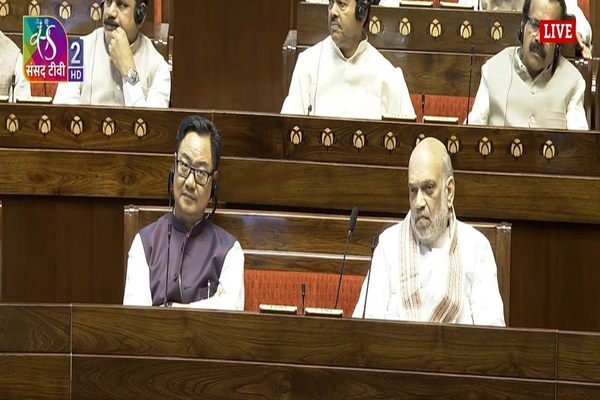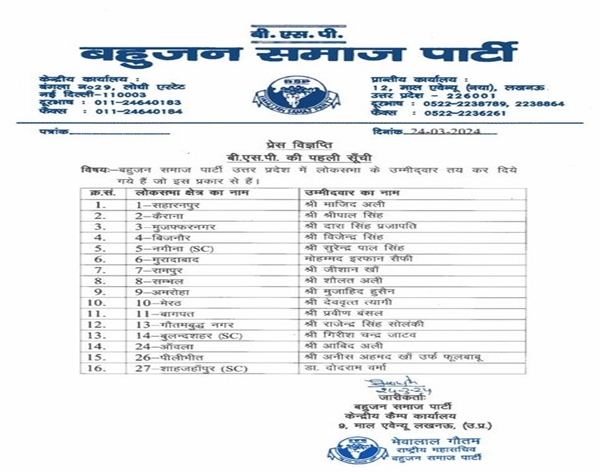Parliament has passed the Waqf (Amendment) Bill, 2025, with the Rajya Sabha approving it in the wee hours today. The Upper House cleared the Bill with 128 members voting in favour of it while 95 members voted against the legislation. The Rajya Sabha held a discussion on the Bill for around 12 hours. The Lok Sabha has already approved the Bill.
The Waqf (Amendment) Bill 2025 aims to streamline the management of Waqf properties, with provisions to safeguard heritage sites and promote social welfare. The legislation also aims to improve governance by enhancing transparency in property management, streamlining coordination between Waqf Boards and local authorities and protecting stakeholders’ rights. The Bill also seeks to improve the economic and social status of Muslim women, particularly widows and divorced women. The Bill is intended to make the Waqf Board more inclusive, having representation from different Muslim sects for better Waqf governance and decision-making. The Waqf (Amendment) establishes a secular, transparent, and accountable system for Waqf administration.
Replying to a debate on the bill, Minority Affairs Minister Kiren Rijiju said that crores of poor Muslims will benefit from this legislation and in no way does it harm any single Muslim. He said, the legislation does not interfere in the Waqf properties. He said the Narendra Modi government works with the vision of Sabka Saath and Sabka Vikas, and it does not discriminate against any community. He said that poor and Pasmanda Muslims came to meet him and urged that the bill should be passed soon. He said that the government wants to bring the Muslims into the mainstream of the country. Mr Rijiu said that in the Joint Parliamentary Committee, the views of Members were also heard and their suggestions were incorporated in the bill. He made it clear that there will be 22 members in the Central Waqf Council, including the ex-officio members and in the Council, there will not be more than four non-Muslim members. He also said that out of the eleven members of the Waqf Board, only three will be Non-Muslims. He added that the Waqf Board is a statutory body and it should be secular, but still, the government restricted the number of non-Muslims in it.
Earlier while moving the bill, the Minority Affairs Minister said that the bill has been brought after a detailed consultation with the stakeholders as well as in the Joint Parliamentary Committee. He urged the opposition parties to support this bill.
While participating in the discussion, Dr. Syed Naseer Hussain of the Congress said that this bill is misleading and has been brought with the intention of communal polarisation. He alleged that the BJP is trying to divide the communities. He said that during the BJP government, the budget was not allocated for the Waqf Council, and salaries were not paid to the employees of the council. Interrupting Dr. Hussain, Union Home Minister Amit Shah said that the opposition is trying to mislead the people.
Participating in the debate, Union Minister and Leader of the House JP Nadda hoped that the House would support UMEED- Unified Waqf Management Empowerment, Efficiency and Development. He added that the basic aim of this Bill is to bring in reforms and proper management of Waqf properties.
Tiruchi Siva of the DMK opposed the bill alleging that a certain community is being targeted. He said the bill is anti-secular and unconstitutional. Mohammad Nadimul Haque of the TMC said the bill is against the fundamental rights of the people. Sanjay Singh of the Aam Aadmi Party termed this bill unconstitutional and urged the government to take it back. Professor Manoj Kumar Jha of the RJD questioned the intent and content of the bill.
Radha Mohan Das of the BJP alleged that no work was done to improve the lives of poor Muslims during the Congress rule. He said that Prime Minister Narendra Modi brought this bill for the betterment of poor Muslim communities.
JD(S) chief HD Devegowda congratulated the Narendra Modi government for bringing the Bill. He said Waqf properties have been misused by people who are rich or strong enough in the community.
Sanjay Raut of the Shiv Sena (UBT) alleged that this Bill is not in favour of the nation. Samajwadi Party’s Dr Ram Gopal Yadav claimed that the country is moving towards a totalitarian state instead of a democratic state.
Leader of the Opposition Mallikarjun Kharge opposed the Bill and demanded the government to withdraw it. He said that there are shortcomings in the bill and it is against the Constitutional norms.
Dr M Thambidurai of AIADMK said that the government has brought the legislation to change the composition of the Waqf Boards and the Waqf Board Council.
Sudhanshu Trivedi of the BJP said that the government has brought this bill for the welfare of poor Muslims.
Minister of State for Social Justice and Empowerment Ramdas Athawale said that the bill is not unconstitutional as it integrates every minority community.
Abhishek Manu Singhvi of the Congress, Praful Patel of the NCP, Dr Fauzia Khan of the NCP-SCP, Gulam Ali Nominated, Milind Murli Deora of the Shiv Sena, and Jose K Mani of KC(M) were among those who participated in the debate.
Parliament also gave its approval to the Mussalman Wakf (Repeal) Bill, 2025 which repeals the Mussalman Wakf Act 1923, with the Rajya Sabha approving it. The Lok Sabha has already given its nod to the Bill.















